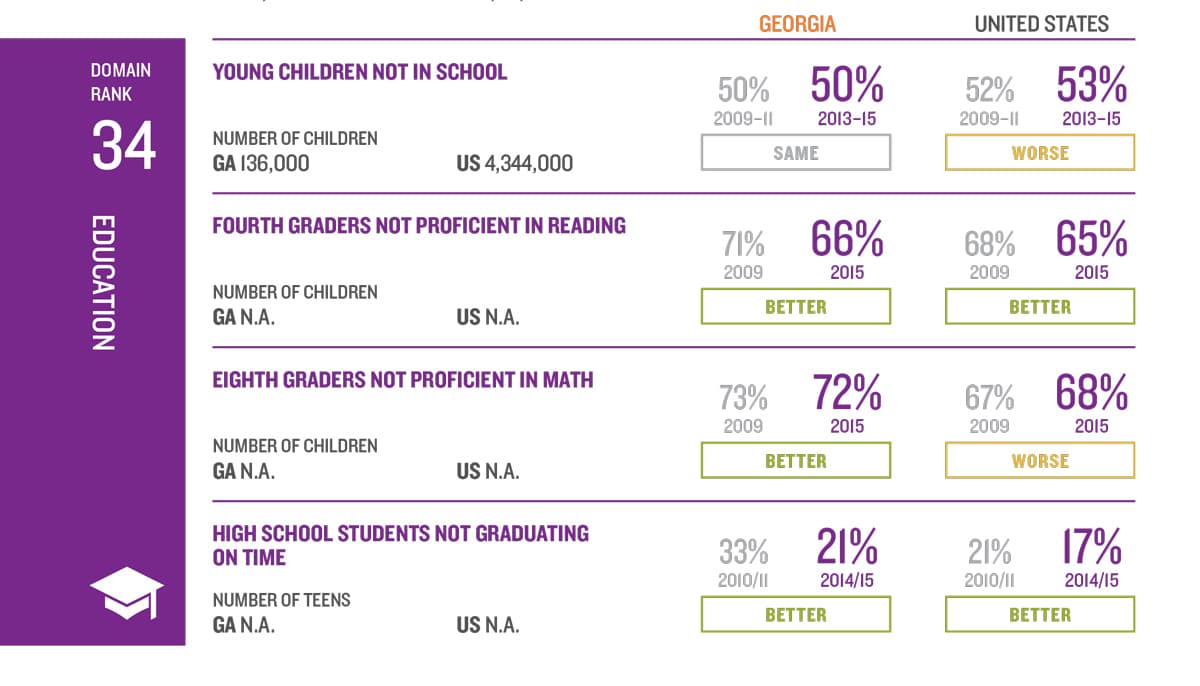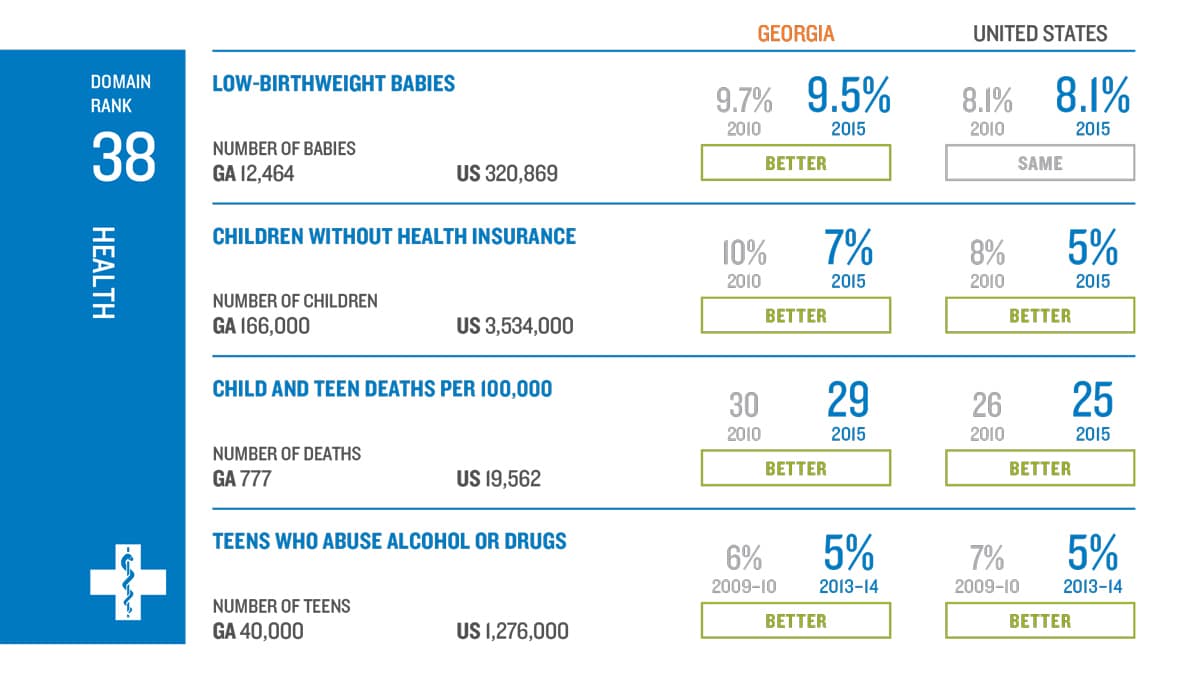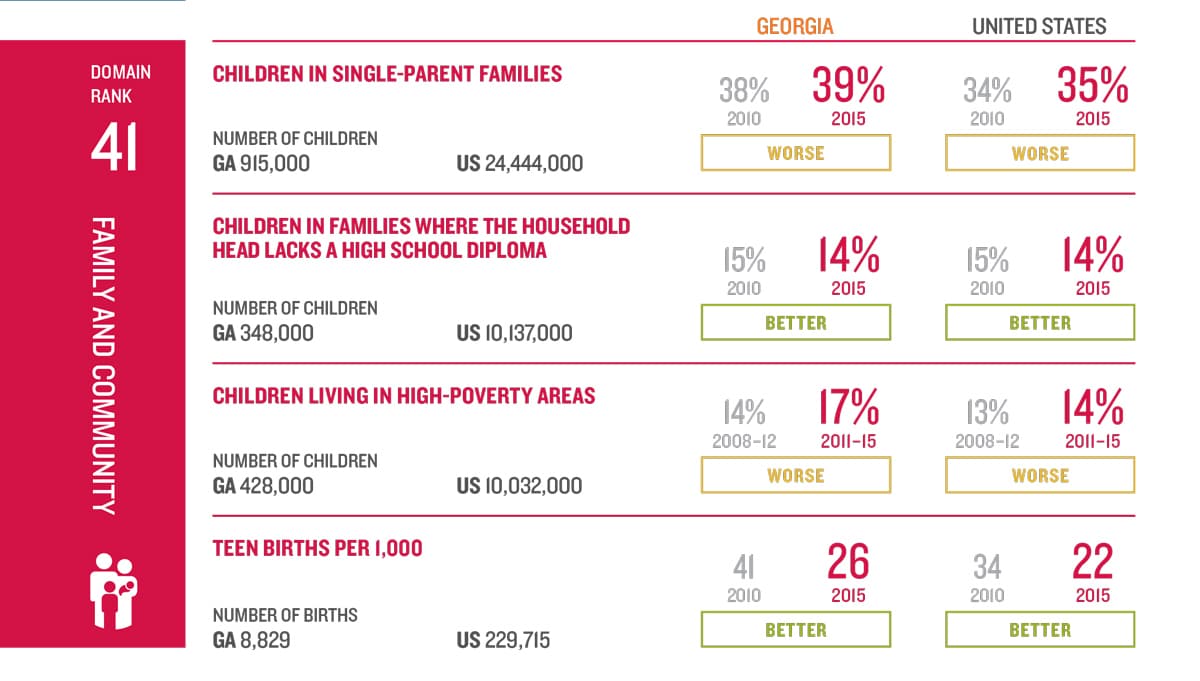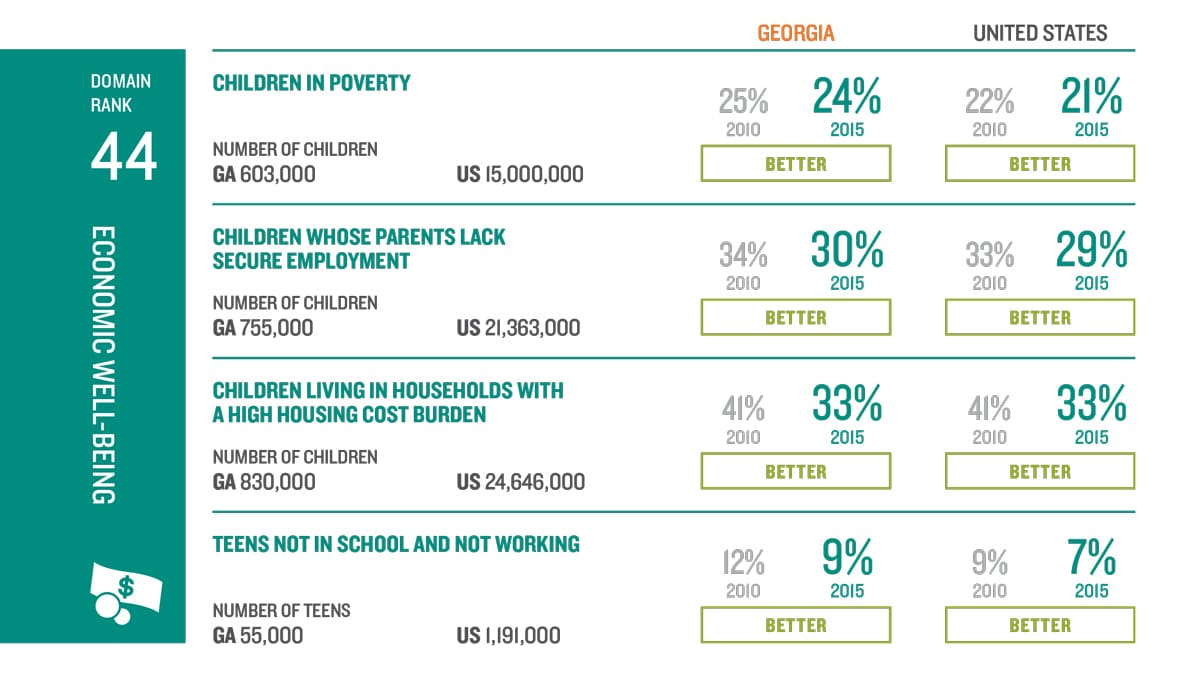Georgia Ranks 42nd in the Nation for Child Well-Being
Print This Post
2017 KIDS COUNT Data Book shows Georgia improving in education and economic well-being, yet continues to struggle with health and community
For the second consecutive year, Georgia ranks 42nd in overall child well-being, while seeing some improvements in economic well-being and education, according to the 2017 KIDS COUNT Data Book released today by the Annie E. Casey Foundation.
The annual KIDS COUNT Data Book uses 16 indicators to rank each state across four domains—health, education, economic well-being, and family and community—that represent what children need most to thrive. The report, which reviews annual progress across a five-year period, shows that while Georgia has seen some improvements since 2010, there are still gaps in child well-being across all four domains.
Georgia has seen improvements in the economic well-being of families, with declines in the percentages of child poverty, teens not attending school nor working, children living in families where no parent has a full-time, year-round job, and families burdened by spending a third of their pay on housing. Despite this progress, the percentages of children facing economic distress remains high.
The percentage of low birthweight babies, at 9.5 percent, remains higher than the national average of 8.1 percent, yet Georgia’s teen birth rate has fallen, decreasing by 37 percent since 2010. In education, the state made little progress reducing the percentage of eighth graders not proficient in math, which dipped only from 73 to 72 percent over a five-year period. However, the state experienced a decline in fourth graders not reading at grade level, dropping from 71 percent in 2009 to 66 percent in 2015.
“Math proficiency still lags behind reading proficiency, which is also true at the national level,” said Rebecca Rice, Georgia KIDS COUNT manager at Georgia Family Connection Partnership (GaFCP). “We’re happy to see that reading proficiency in Georgia continues to improve, and we’re confident that the work GaFCP is doing with Get Georgia Reading—Campaign for Grade-Level Reading and our partners from the public and private sectors will continue to move our numbers in the right direction.”
GaFCP’s cohort work targeting early childhood health and education and civic health, along with continued local work through its statewide network of county Collaboratives and state partnerships, are aimed at improving outcomes for children and families in Georgia.
According to the 2017 KIDS COUNT Data Book, Georgia ranks:
- 34th in education: Georgia’s rate of children not attending preschool remains at 50 percent. According to the new measure of on-time high-school graduation, 21 percent of Georgia students failed to graduate from high school on-time, compared to 17 percent, nationally.

- 38th in health: The percentage of children who do not have health insurance continues to fall, which is a good sign. However, the child and teen death rate is much higher than it was in 2010, standing at 29 per 100,000.

- 41st in the family and community domain: While we see encouraging trends, such as fewer children living in houses where parents lack a high-school diploma, there was a stark increase in the number of children living in high-poverty areas, from 355,000 in 2010 to 428,000 in 2015.

- 44th in economic well-being: Child poverty fell below 25 percent for the first time since the recession, during which time child poverty soared to its highest level of 27 percent in 2012.

“Most of the indicators in Georgia are moving in the right direction, said GaFCP Executive Director Gaye Smith. “And while we still lag the national average on several indicators, our state mirrors the national trends, which are positive. What we need to see going forward, and what we hope that our work and our strong partnerships at the state and local levels will accomplish, is not just improvement, but accelerated improvement that reflects greater well-being for all of Georgia’s children and families.”
Go to the national 2017 KIDS COUNT Data Book.
Download the Georgia Profile.
Visit Georgia KIDS COUNT at gafcp.org/kids-count for interactive statewide data.
Contact:
Rebecca Rice
Georgia KIDS COUNT Coordinator
404-507-0488
rebecca@gafcp.org
Bill Valladares
GaFCP Communications Director
404-739-0043
william@gafcp.org
The Annie E. Casey Foundation creates a brighter future for the nation’s children by developing solutions to strengthen families, build paths to economic opportunity and transform struggling communities into safer and healthier places to live, work and grow. KIDS COUNT is a registered trademark of the Annie E. Casey Foundation.
Georgia Family Connection Partnership (GaFCP) is a public-private partnership created by the State of Georgia and investors from the private sector to assist communities in addressing the serious challenges facing children and families. GaFCP also serves as a resource to state agencies across Georgia that work to improve the conditions of children and families. Georgia KIDS COUNT provides policymakers and citizens with current data they need to make informed decisions regarding priorities, services, and resources that impact Georgia’s children, youth, families, and communities. Georgia KIDS COUNT is funded, in part, through a grant from The Annie E. Casey Foundation, a private charitable organization dedicated to helping build better futures for disadvantaged children in the United States.
